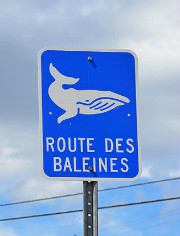|
Home
|
Sep 21, 2015
This week’s themeWords about words This week’s words kenning mot juste holophrasm pochismo antonomasia 
Whale Road
Photo: Wikimedia
A.Word.A.Day
with Anu GargThis week we are going meta. We’ll feature words about words. The English language has plenty of words for things. And it has many words about words as well. As for words about words about words, we’re not sure. Maybe we’ll have to go to another dimension for that. kenning
PRONUNCIATION:
MEANING:
noun: A figurative, usually compound, expression used to describe something. For example, whale road for an ocean and oar steed for a ship.
ETYMOLOGY:
From Old Norse kenna (to know). Ultimately from the Indo-European root
gno- (to know), which is also the source of know, recognize, acquaint,
ignore, diagnosis, notice, normal,
prosopagnosia,
gnomon,
anagnorisis, and
agnosia.
Earliest documented use: 1320. Kennings were used especially
in Old Norse and Old English poetry.
USAGE:
“The hero, Beewolf (a kenning for bear, named the ‘bee wolf’ for its
plundering of hives), heads to the Golden Hall.” John Garth; Monster Munch; New Statesman (London, UK); May 30, 2014. “In the dawn of the English language the earliest poets or scops invented words like ‘battleflash’ to describe a sword, or they would identify a boat by its function with a kenning like ‘wave-skimmer’.” Samuel Hazo; What’s in a Name?; Pittsburgh Post-Gazette; Feb 17, 2008. See more usage examples of kenning in Vocabulary.com’s dictionary. A THOUGHT FOR TODAY:
Invention requires an excited mind; execution, a calm one. -Johann Peter Eckermann, poet (21 Sep 1792-1854)
|
|
Subscriber Services
Awards | Stats | Links | Privacy Policy
Contribute | Advertise
Awards | Stats | Links | Privacy Policy
Contribute | Advertise
© 1994-2026 Wordsmith